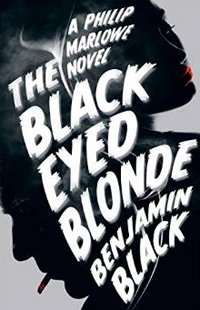Author John Banville has won the Booker Prize. Here he writes as Benjamin Black, embarking on a homage to Raymond Chandler by recreating Philip Marlowe in a story meant to follow on from the 1953 novel The Long Goodbye. Using a title Chandler might even have used himself, The Black Eyed Blonde, Black has chosen an unenviable task – to try and be completely authentic to Chandler’s original tone of voice and come up with a story that fits into the canon. Joe Gores did a fantastic job with Spade & Archer, a proposed prequel to The Maltese Falcon, and we hoped Benjamin Black had produced something equally fitting.
In true Chandler fashion, the story opens in the early 1950s in a steaming hot Los Angeles, with our introspective gumshoe detective sweating in his office, and awaiting his next case. Cue a beautiful, mysterious and slightly tortured female client – the black-eyed blonde of the title – in search of an errant former lover. Although she’s a married woman and comes from a rich and influential family, Clare Cavendish needs Marlowe’s help in tracking down the slippery but charming Nico Peterson, whose disappearance is of some concern to her.
Of course Marlowe must fall for the dame, a dame who neglects to pay him at that, so he embarks on a search for Peterson. As he becomes intimately embroiled in Cavendish’s case and discovers more about Peterson’s unlawful activities, Marlowe finds himself is threatened by a local gangster. He uncovers the truth behind the veneer of a rich gentleman’s club, and is visited by a ghost from the past. Marlowe finds himself in deep water – literally – and needs all of his cunning to extricate himself from this thorny case.
The Black Eyed Blonde will transported you back to Marlowe’s world, and Black’s recreation of the sights, sounds and atmosphere of Chandler’s Los Angeles is as impressive as it is vivid. Having re-read The Long Goodbye recently, I take issue with criticisms other reviewers have raised over how authentic or credible a follow-up this is. It is a more than satisfying sequel to the events in, and tone of, earlier Philip Marlowe stories.
The outstanding feature is how the author has captured the narrative voice and style of Chandler’s private detective. His trademark introspection, wise-guy attitude and cynical asides are all there. Black also captures, in Marlowe’s a spare and uncompromising voice, all the protagonists, with the narrator’s observations and feelings bringing them to life. Respect for Chandler’s reputation and craft is in evidence throughout, and Marlowe’s natural, cynical humour will raise a smile.
Writing convincing crime fiction is not easy, but walking in the footsteps of a master like Raymond Chandler is almost impossible. I was more than satisfied with this homage to one of the most influential crime writers of all time. Raymond Chandler would be more than happy with the result. I certainly was.
Read our Raymond Chandler primer here.
Mantle
Print/Kindle/iTunes
£6.59
CFL Rating: 5 Stars










